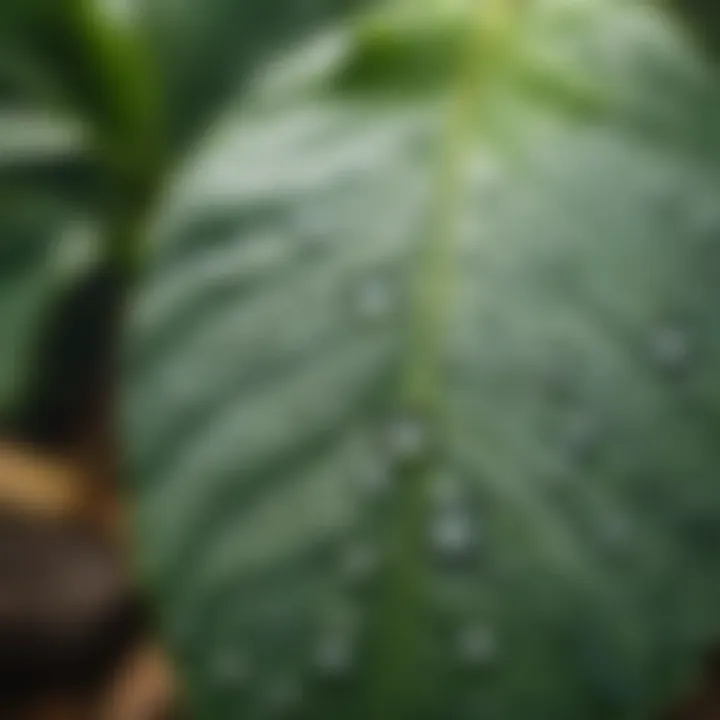Thought-Provoking Quotes on the Essence of Water


Intro
Water is a perplexing entity, constantly shaping our lives, thoughts, and the environment around us. It’s not just a necessity for survival; it symbolizes various notions transcending mere sustenance. This article embarks on a journey through the rich tapestry of quotations that reflect on water's multifaceted nature. We delve into the thoughts of poets, philosophers, and scientists, uncovering the layers of meaning these quotes hold.
Analyzing these sayings is not as simple as it may seem. Each word carries the weight of personal experience and collective understanding, paving a path towards deeper awareness. By navigating through philosophical, environmental, and spiritual dimensions, we come to appreciate water as more than just a liquid. It's a bridge between humanity and nature—connecting, healing, and inspiring.
As we weave through historical perspectives and contemporary insights, expect to find profound takeaways that resonate with both intellects and hearts alike. Together, we’ll explore how these reflections can shape our views towards water and, consequently, towards life itself.
Prelude to Water's Significance
Water is often described as the essence of life, a phrase that, while seemingly overused, encapsulates a profound truth. Without this vital resource, existence as we know it would not be possible. In this exploration, we delve into not just the physical importance of water, but also its cultural, philosophical, and emotional resonance across different contexts. By examining quotes from various thinkers throughout history, we can appreciate the multifaceted roles that water plays within our lives.
One key aspect to note about water is its universal significance; it's a shared resource that transcends borders and cultures. Every person on this planet relies on water for survival, and yet its meaning can differ vastly from one community to another. This discrepancy opens up avenues for deeper discussion, highlighting how various societies have revered water historically and continue to do so today.
Moreover, engaging with thoughts on water allows us to reflect on its importance beyond mere survival. Many thinkers have posited that our relationship with water is not only one of dependency but also of respect and introspection. Understanding these perspectives can enrich our appreciation for this essential element and prompt us to consider our responsibilities regarding sustainability and environmental stewardship.
Cultural Reverence for Water
Throughout history, water has been a source of inspiration and reverence. Different cultures around the world have formed rich myths and rituals centered around water. For instance, in many Indigenous cultures, water is viewed as a sacred element, representing purity and life. The Aborigines of Australia often engage in ceremonies that honor water as a vital resource, acknowledging its role in nurturing both the land and people.
"In every drop of water, there is a story of life."
This quote echoes the sentiment that every body of water holds significance beyond its physical properties. Such expressions illustrate how societies integrate the natural world into their spiritual and social constructs.
Additionally, various religious practices celebrate water. For example, in Hinduism, the Ganges River is not merely a river but a goddess. Pilgrimages to its banks for ritual baths symbolize cleansing not just of the body, but also of the soul. Through these narratives, we see that water serves not only as a necessity but also as a deep-seated cultural identifier.
Water as Life's Essence
Examining water strictly from a biological viewpoint reveals its fundamental role in sustaining life. Every organism, from the smallest bacteria to the largest whales, requires water to thrive. Biologically speaking, water facilitates essential processes, such as digestion and nutrient transport in the human body. It is often stated that we are made up of approximately 70% water, underscoring its critical role in our physiological makeup.
However, beyond the biological importance, water serves as a powerful metaphor for life itself. Just as we need water to survive, our experiences shape how we interact with the world. Quotes about water in this context often touch on themes of adaptability and resilience. For instance, consider the saying: "Be like water, my friend." This reflects the idea that just as water takes the shape of its container, we too must remain flexible and responsive to the changes life brings our way.
Historical Context of Water Quotes
Understanding the historical context of quotes about water helps us see how human societies have viewed this essential element across centuries. Water is not just a resource; it embodies deep meanings in various cultures, philosophies, and religions. By examining these historical perspectives, we can appreciate how previous thinkers articulated their relationship with water. This exploration highlights the relevance of water to our existence, revealing perspectives that can guide contemporary discussions on environmental stewardship and societal values.
Ancient Philosophers and Their Views
From the dawn of civilization, ancient philosophers have contemplated the role of water. Thinkers like Thales, known as one of the first philosophers in Western history, posited that water is the principle of all things. He famously said, "Everything is full of gods," suggesting that water possesses inherent significance beyond a mere physical resource. This perspective laid the groundwork for future philosophical inquiries into the nature of existence.
Moreover, Plato, in his dialogues, touched upon water's metaphorical importance. In the realm of ideal forms, he implied that water represents the essence of change and fluidity within the human experience. Such views provide insight into a belief that water is not only vital for life but also a symbol of deeper existential truths.
The Chinese philosopher Laozi also emphasized water's qualities, stating, "Nothing in the world is softer and weaker than water. Yet for attacking the hard and strong, there is nothing that can surpass it." This juxtaposes strength and vulnerability, reflecting water's dual nature as a life-giver and a transformative force. If we take these ancient insights to heart, it reminds us of the value of humility and adaptability instead of brute strength in facing life's challenges.
Religious Texts and Water Symbolism
Religious texts throughout history are rich with references to water, revealing its symbolic dimensions in various belief systems. In Christianity, water symbolizes purification and rebirth, epitomized in the sacrament of baptism. The act of immersing an individual in water signifies not only physical cleansing but also spiritual renewal, allowing the person to emerge as a new being, seeking enlightenment.
In Hinduism, the Ganges River is revered as a sacred entity, believed to bestow holy purification. The countless pilgrims who flock to its banks for ritual bathing illustrate the cultural significance attached to water as a medium of spiritual connection. This importance is echoed in the phrase often attributed to the Ganges: "Even a river down to its last brook carries life," highlighting how water is perceived as a lifeline and a source of divine grace.
Furthermore, in Islam, the act of wudu, or ablution, before prayers underscores the necessity of cleanliness. Water serves as a physical manifestation of spiritual readiness and piety, linking everyday actions with intrinsic religious meaning. From these religious perspectives, it is clear that water has played a fundamental role in shaping spiritual beliefs and practices across various cultures, illuminating how people have sought to connect with the divine through the tangible essence of water.
As we delve deeper into the philosophical and religious implications, we uncover a tapestry of thought that shapes our understanding of water. This historical context enriches the contemporary conversation surrounding water, urging us to reflect on our own relationship with this life-sustaining element.
Literary Reflections on Water
Water, in its myriad forms, has long captivated the imagination of writers, poets, and playwrights alike. This section delves into the literary reflections on water, focusing on how this essential element serves not just as a setting or backdrop, but as a powerful symbol interwoven with the emotional, philosophical, and social fabric of human experience. Through the lens of literature, we can explore the profound significance of water in shaping narratives and evoking deep feelings within readers.
Poetic Expressions
Poetry, often characterized by its emotive language, has a unique capacity to explore the depths of human experience, and water often plays a central role in this exploration. Poets use water as a metaphor for a range of human emotions—from joy and tranquility to sorrow and longing. For instance, consider the serene imagery of a calm lake reflecting the morning sun. This image can evoke feelings of peace and stillness, inviting readers to connect with moments of calmness in their own lives.
Moreover, in works by poets like Robert Frost or Mary Oliver, water often embodies themes of change and impermanence. Their verses about rivers winding through landscapes serve as reminders of life's continual flow and transformation. As Frost musingly writes, "If I were to choose, I would be a river—forever flowing, forever changing, yet steadfast in my purpose." Such poetic expressions offer insights not just into the natural world but also into the emotional landscapes we traverse.
Some recurring motifs in poetical expressions about water include:


- The Cycle of Life: Water as an essential element sustaining life.
- Cleansing and Renewal: Symbolizing rebirth or conflict resolution through the act of purification.
- Melancholy and Yearning: Using water to mirror human loss, nostalgia, or longing.
"In every drop of water, there lies a story untold."
Narratives and Their Water Themes
In narratives, whether fiction or memoir, water serves as a vital character itself, affecting the plot and emotions of the characters. It can signify abundance and prosperity, or conversely, drought and despair. Various authors have harnessed the elemental nature of water to craft stories that reflect societal values and conflicts.
Look at works like Hemingway's The Old Man and the Sea, where the ocean is not merely a setting but a crucible for conflict, exploration, and human resilience. The struggle against the fish—and ultimately against nature itself—mirrors internal conflicts, reflecting the human condition.
In contemporary literature, water themes often dive into the environmental and social implications of water scarcity. Writers from diverse backgrounds use their narratives to highlight real-world issues and emphasize our connection to this vital resource. Notable mentions are narratives that detail the plight of communities dependent on rivers that are drying up or those advocating for clean water access.
Some important themes prevalent in narratives involving water include:
- Conflict and Resolution: Stories of struggle like those in The Grapes of Wrath highlight the desperation caused by a thirsty land.
- Exploration and Discovery: Characters embarking on journeys by sea or river, encountering both physical and emotional challenges along the way.
- Community and Connection: How water bodies serve as gathering places for communities, encapsulating shared histories and memories.
By examining these literary reflections on water, we gain deeper insights into not only the narrative structure but also the cultural and emotional connotations of this elemental force. Each reflection enriches our understanding of how deeply intertwined water is with the human experience.
Contemporary Voices on Water
In the current era, the conversation surrounding water has become increasingly pressing, intertwining with environmental concerns, social justice, and personal reflections. This section seeks to highlight the significance of contemporary voices on water, offering insight into how modern thinkers and activists are shaping our understanding of this vital resource. The relevance of their thoughts stems from the urgent need to address the escalating water crises worldwide and the unique perspectives they provide that blend philosophy, activism, and personal experience.
Environmental Activism and Water Quotes
Today, environmental activists are at the forefront of advocating for water conservation and management. Their voices often resonate widely, as they shine a light on the dangers posed by pollution, climate change, and mismanagement of water resources. For these individuals, quotes are not merely words but powerful tools for mobilization. For instance, activists like Wangari Maathai, a Nobel Peace Prize winner, emphasized the interconnectedness of water and life. She once stated, "We cannot tire or give up. If we do, who will take our place?" This quote encapsulates the call to action that drives many activists today.
The urgency surrounding water issues is mirrored in quotes from organizations such as Greenpeace, which remind us that "Water is not a resource; it is a human right." Such sayings compel society to reevaluate its approach to water, urging individuals to consider the ethical implications of their actions. Here are several elements that showcase the importance of quotes in the discourse of water activism:
- Raising Awareness: Thoughtful quotes can cut through the noise, making complex issues more digestible and relatable.
- Inspiring Action: Activists use compelling words to inspire individuals and communities to take concrete steps toward lessening their water footprints.
- Creating Solidarity: Water quotes can foster a sense of community among activists, helping to bond people over shared objectives.
Reflections by Modern Thinkers
Modern thinkers—ranging from philosophers to scientists—bring forth unique insights on the role of water in our existence. Their reflections often blend personal narratives with broader societal issues, painting a more comprehensive picture of water’s significance. For instance, the renowned author and philosopher Clarissa Pinkola Estés remarked, "The river flows not just as water, but as the embodiment of wisdom and strength that connects us all." This encapsulates a deeper understanding of the element, positioning it as a bridge between individuals and their environment.
Thinkers like Albert Einstein have also weighed in with impactful quotes such as, "Out of clutter, find simplicity. From discord, find harmony. In the middle of difficulty lies opportunity." While not directly referencing water, these words resonate with the spirit of conservation and clarity that many seek in the context of safeguarding our waterways. Below are some key takeaways from modern reflections on water:
- Water as a Shared Resource: Many thinkers stress the notion that water transcends borders and cultures, reminding us of our collective responsibility.
- Philosophical Depth: Reflective quotes encourage us to ponder our relationship with nature and confront inconsistencies in our values.
- Interconnectedness: Insights from diverse fields reveal that water is more than a utility; it’s a vital part of our ecosystem and identities.
The thought-provoking nature of modern quotes on water can catalyze discussions that deepen our understanding and encourage proactive engagement with this perilously finite resource.
Scientific Insights into Water
The examination of water from a scientific perspective is fundamental in comprehending its role not just as a resource but as a cornerstone of life. Water is more than just a liquid; it's a compound that drives the biochemical processes essential to survival for all living organisms. Understanding the scientific principles behind water's properties can unmask the intricate mechanisms that support life on our planet.
Importance of Water's Unique Properties
Water possesses several unique properties that are critical for sustaining life. Its polarity is a prime example, making it an excellent solvent and enabling countless chemical reactions to occur in biological systems. The concept of pH levels, for instance, underscores water's role in regulating bodily functions. The acidity or alkalinity of body fluids influences metabolic processes; hence, maintaining proper hydration is vital for health.
Moreover, consider the significance of thermal regulation provided by water. Its high specific heat capacity allows water bodies to absorb and retain heat, influencing climate and weather patterns. This has a profound impact on agricultural practices, ecosystems, and biodiversity.
Environmental scientists continuously explore the implications of water scarcity caused by climate change and unsustainable practices. Understanding these factors helps in mitigating crises related to droughts and floods, making water a central focus in ecological studies.
Water's Role in Sustaining Life
Water is universally recognized as necessary for life. It is the medium where all metabolic reactions transpire. Nearly all organisms depend on water to thrive; humans, for example, are comprised of about 60% water.
- Biochemical Reactions: Most biological processes, including nutrient transport and waste elimination, hinge on water’s unique roles within cells. Enzymes, which facilitate biochemical reactions, require an aqueous environment to function correctly.
- Regulation of Body Temperature: Water assists in maintaining a stable internal temperature through sweating and respiration.
- Nutritional Transport: Water is fundamental for digestion and the absorption of nutrients. It helps dissolve minerals and vitamins, which are then transported through the bloodstream.
- Habitat for Aquatic Life: From fish to microorganisms, water bodies serve as habitats, providing essential resources and regulating temperatures for countless species.
Thus, its absence can disrupt ecosystems, elevate mortality rates, and challenge human civilizations. It’s evident that managing water resources is not just an environmental issue, but a vital humanitarian cause.
Quotes from Renowned Scientists
The insights of scientists shed light on both the intricacies of water's scientific aspects and its profound impact. Here are some notable quotes:
"We forget that the water cycle and the life cycle are one."
— Jacques Cousteau
This statement elegantly encapsulates the interdependent nature of water and life. It serves as a reminder that water does not merely sustain life but is an integral part of the biosphere.
Also consider the words of Albert Einstein:


"A human being is a part of the whole called by us universe, a part limited in time and space. He experiences himself, his thoughts and feeling as something separated from the rest – a kind of optical delusion of his consciousness."
While this quote broadly addresses human perception, it can be interpreted in the context of water's role in connecting all forms of life. The optical delusion may refer to the misconception of separateness; all life forms, ultimately, are bound by water.
Understanding these insights from reputed scientists not merely enriches our knowledge but also motivates a deeper inquiry into how water shapes our world.
In summary, the scientific inquiry into water’s multifaceted roles is one filled with revelations. It not only underscores the necessity of water for life but emphasizes its complexities and vulnerabilities in the face of human impact and climate challenges.
Philosophical Implications of Water Quotes
Water has always been more than just a simple necessity for human existence; it serves as a profound symbol across various philosophies. In this section, we investigate the deep philosophical implications of quotes related to water. These sayings carry intrinsic meanings that compel us to reflect on not only what water means to us but also how it connects to broader concepts like change, transformation, and existential contemplation. The insights drawn from these quotes encourage readers to think critically about their relationship with water – a fundamental element in life – and reveal that our connection to it is often layered with philosophical significance.
Water as a Metaphor for Change
Throughout history, thinkers and writers have employed water as a powerful metaphor for change. Water’s capacity to flow, shift, and transform mirrors the journey of human life, suggesting the inevitability of change and adaptation. For example, Heraclitus famously remarked, "You cannot step into the same river twice." This idea illustrates that just like a river alters as it flows, so too do our lives continuously evolve.
Water's very essence promotes a sense of fluidity, prompting us to accept change rather than resist it. In both personal journeys and collective experiences, water reflects transitional phases that remind us life is not static. The cycles of water, such as evaporation and precipitation, echo the notion that endings lead to new beginnings. This perspective can instill comfort in those facing life's inevitable transformations, encouraging resilience and openness to whatever lies ahead.
"Water is the source of life, and its movement is the metaphor for our journey."
Ambiguity in Water's Nature
Delving into the ambiguous nature of water presents another enriching facet of its philosophical implications. Water can be both nurturing and destructive—think of the gentle stream that quenches thirst versus the merciless flood that devastates regions. This duality invites a rich dialogue about how we perceive our realities and the contradictions within them.
Many philosophical traditions address this ambivalence. In Eastern philosophies, water symbolizes harmony and adaptability despite its potential for devastation. Zen teachings often use water to describe clarity and tranquility, while paradoxically acknowledging that it can also bring chaos.
Furthermore, the structure of water, existing as a fluid yet having the potential to become rigid ice, embodies the fluidity of life’s experiences. This complexity invites us to embrace uncertainty and find balance amidst contradictions.
In essence, although water is fundamentally essential for life, its multifaceted character compels us to ponder deeper questions regarding nature, existence, and the human experience.
Psychological Associations with Water
Water is not just a physical element; it also embodies a spectrum of psychological associations that resonate deeply within human cognition and emotion. In this section, we explore how water shapes our thoughts and feelings, distinguishing its multifaceted roles in our lives. Understanding these psychological associations sheds light on why water elicits powerful responses and serves as a backdrop for introspection and healing.
Water and Human Emotion
Water often mirrors our emotional state, functioning almost as a canvas for the human experience. For many, the sound of rippling water or crashing waves can evoke feelings of tranquility, reminiscent of a peaceful day at the beach or a quiet moment in nature. Conversely, turbulent water might symbolize chaos or unrest in one’s life. Here’s how water influences our emotions:
- Calming Effect: Many individuals find solace near bodies of water. Research indicates that environments featuring water can lower stress levels and promote relaxation. This is often referred to as the "blue space effect," where the presence of water enhances overall well-being.
- Symbolic Representation: Water can symbolize tears, conveying sadness or joy, thus acting as a profound reminder of shared human experiences. William Wordsworth captures this beautifully: "The river flows, and with each drop of water, a tear is shed, a joy is celebrated."
Moreover, various cultures see water as a conduit for emotional expression. For instance, in some Native American traditions, flowing water is likened to the flow of life itself, encouraging individuals to embrace their emotions and express them freely. The linkage between water and emotion reminds us of our intrinsic, often unspoken relationships with the natural world.
Cleansing and Renewal Themes
Water’s cleansing properties are rooted not only in the physical sense but also in the psychological. The act of cleansing with water resonates many different ways:
- Ritualistic Cleansing: In numerous cultures, water is integral to rituals aimed at healing and renewal. Baptisms in Christianity, for example, symbolize purification and the washing away of sins. The act itself signifies new beginnings, embodying hope and transformation.
- Personal Renewal: For individuals, taking a shower or a bath often serves as a metaphorical reset. People frequently report feelings of rejuvenation after these moments, akin to washing away the worries of the day. This form of self-care has been emphasized in different psychological studies highlighting its restorative effects.
"Water is the source of life; its presence washes away the past and nurtures a fresh start.”
In literature and art, the theme of cleansing often surfaces, signifying hope or rebirth. This connection is evident in numerous works where showers or rains herald a change in characters’ journeys, signifying emotional breakthroughs.
In summary, water resonates profoundly in our psyche. Its presence evokes emotion and symbolizes renewal, acting as a reminder of life’s cyclical nature. As our exploration into psychological associations with water unfolds, it reveals the depth of our connection to this essential element and its imperative role in the human experience.
Water in Art and Expression
The theme of water permeates various forms of art, making it a vital topic in understanding how artists have engaged with this elemental force. Across history, water has inspired countless expressions, from the shimmering reflections in painting to haunting melodies in music. Art and expression provide a unique lens through which we can appreciate water's multifaceted characteristics. By examining how water has been portrayed, we come to understand its role not just as a resource but as a powerful symbol in our lives.
Influence on Visual Arts
Visual arts have long found inspiration in water. Whether it’s the bold brush strokes of Claude Monet capturing the delicate interplay of light on water surfaces or Katsushika Hokusai’s dynamic waves from The Great Wave off Kanagawa, artists frequently draw upon the aesthetics and moods brought by water.
Water in visual arts often reflects deeper meanings. For instance, consider how water can evoke tranquility or chaos, depending on the context. Artists like Turner showcased stormy seas, illustrating nature's ferocity, while others depict serene lakes symbolizing peace and reflection. The essence of water transcends the visual; it carries emotions and narratives that resonate universally.
"A picture is worth a thousand words, but adding water can express a thousand emotions."
This sentiment illustrates how artists can invoke complex feelings lurking below the surface.


Furthermore, the incorporation of water in sculptures also deserves mention. Artists like Olafur Eliasson use water's physical properties to create immersive environments, drawing viewers into a visceral experience. Through installations like The Weather Project, he uses mist and light to alter perceptions of space, showcasing how water can be more than just an element; it becomes a transformative experience.
Water's Role in Performing Arts
Water is not just a visual muse; its influence extends deeply into the performing arts as well. Theatre and dance often utilize water elements to symbolize emotional currents or to create immersive atmospheres. For example, performances that incorporate rain or water imagery often manifest themes of rebirth and renewal, emphasizing the duality of water's nature—both nurturing and destructive.
In opera and music, water-themed compositions frequently surface, portraying its calm yet tumultuous spirit. Composers like Debussy in La Mer echo the ebb and flow of the ocean, allowing listeners to feel the waves' rhythm through music. This musical expression captures water’s essence in a way that visual arts cannot, enveloping the audience in sound and evoking personal memories related to water.
Moreover, contemporary dance often employs water as an integral part of choreography. When dancers perform in or around water, they symbolize life’s fluidity, reinforcing the idea that existence is constantly shifting and evolving.
The way bodies intertwine with water echoes human experiences of love, loss, and connection.
Through both visual and performing arts, water serves as a medium for exploration and reflection. It creates a dialogue between the viewer, performer, and the element itself, fostering a deeper appreciation for its enduring significance in our lives.
The Future of Water: Quotes on Sustainable Practices
In an age where environmental concerns shape global discourse, the significance of sustainable water practices comes sharply into focus. Water isn’t just a vital resource; it’s the cornerstone of human survival and ecological balance. The future of water hinges on our ability to manage it wisely, ensuring accessibility for generations to come. This section intends to explore key insights regarding sustainable water practices through various quotes that reflect our collective responsibility.
Global Perspectives on Water Management
Effective water management touches on numerous sectors, from agriculture to urban planning. Across the globe, cultures have varied approaches to handling this precious resource, shaped by their geographic and climatic conditions. For instance, Sweden’s advanced wastewater treatment systems stand as a testament to the country’s commitment to recycling water, influencing other nations' strategies.
When quotes from global leaders and thinkers resound across forums, they reveal not only a call to action but also the wisdom gained from diverse experiences. Take for instance:
"When the well is dry, we learn the worth of water."
– Benjamin Franklin
This profound statement speaks to the inevitability of consequences resulting from neglecting water management. It reminds us that foresight, planning, and innovative practices are paramount if we’re to prevent future crises.
In various parts of Asia, water is viewed as a communal resource, with collective management practices being integral to local cultures. In India, for example, traditional rainwater harvesting techniques continue to inspire modern sustainability practices, highlighting how ancient wisdom can inform present-day approaches.
In essence, global water management involves a blend of old traditions with modern technology, emphasizing both sustainability and community engagement.
Voices from the Environmental Frontier
The environmental frontier is alive with passionate voices advocating for change. Individuals like Wangari Maathai, a renowned environmental activist, remind us:
"It's the little things citizens do. That's what will make the difference. My little thing is planting trees."
Such statements illuminate the essential truth that significant change often starts with small, localized actions. The engagement of communities and individuals is crucial in paving the way towards sustainable water practices. In each part of the world, grassroot movements emerge, advocating for clean water access and eco-friendly practices.
Organizations like WaterAid have echoed similar sentiments in their work around the world, emphasizing that access to clean water is not only fundamental to health but also to economic development. Their initiatives echo the notion that:
- Sustainable practices empower communities.
- Innovative technologies can enhance water distribution.
- Education about efficient water use is vital.
These voices harness the power of collective action to forge change. By sharing insights and inspiring others, they underline that everyone has a role to play in ensuring the sustainability of water resources.
Looking ahead, the importance of integrating quotes and sentiments from both local communities and global leaders cannot be understated. By fostering a dialogue that spans the entire spectrum of society, we position ourselves to tackle water management challenges with creativity and resolution.
Closure: The Enduring Relevance of Water Quotes
The reverberations of water quotes echo throughout history, revealing just how deeply this element resonates with human existence. Their significance goes beyond mere words; they encapsulate a profound understanding of our connection to the world around us. As we surveyed various perspectives, we gleaned insights from philosophers to artists, highlighting the diverse roles that water plays in our lives and in our environment.
Many thinkers over time have perceived water not just as a physical substance, but as a symbol of life, connection, and renewal. This dual nature is at the heart of many quotes, emphasizing that water sustains life while also serving as a metaphor for the flowing nature of existence itself. Each reflection sheds light on the cultural, emotional, and practical importance of water, urging us to recognize its value in contemporary discourse.
The enduring relevance of water quotes, therefore, lies in their ability to provoke thought and inspire action. They serve as poignant reminders of our responsibility to preserve this vital resource. In an era increasingly marked by environmental challenges, such quotes can stir a collective consciousness that transcends mere awareness, urging individuals and communities to adopt sustainable practices and policies.
"Water is the driving force of all nature." – Leonardo da Vinci
This statement poetically summarizes water's critical role in the natural world and our very being. The metaphoric layers embedded in such quotes resonate with varied audiences—from students contemplating their environmental impact to professionals developing innovative solutions for water conservation.
Final Thoughts on Water's Legacy
As we reflect on water’s legacy, it is clear that its significance permeates through numerous aspects of human life. Water has been revered in many cultures, celebrated in art, and discussed in philosophical discourse. It exemplifies the delicate balance of life itself.
The legacy of water isn't just a relic of the past; it is a living conversation that continues to evolve. By examining the profound thoughts shared by various thinkers, we appreciate how water sustains not only our physical bodies but also nourishes our minds and spirits in myriad ways.
The myriad quotes we've encountered encourage a deeper examination of our personal and societal relationship with water. Each quote is a lens through which we can scrutinize our impact on the environment and recognize the importance of stewardship—cultivating respect for this essential resource.
Encouraging Reflection Through Wisdom
To encourage reflection, the wise words of others can speak volumes, prompting us to pause and consider our place in the mosaic of life. Quotes stimulate an awareness of the interconnectedness that exists within our ecosystem. Through reflection, we can embrace a mindset of sustainability, fundamentally altering the trajectory of our actions regarding water usage.
By examining these quotes, we are nudging ourselves toward consciousness and responsibility. For students, the call could be to learn and advocate for water conservation. For professionals, it may inspire innovative approaches to water management. Ultimately, the enduring wisdom embedded in these words challenges us to think critically about how we may contribute to a healthier planet.
In this way, the exploration of water quotes not only enlightens our understanding but also encourages a mindful approach to the shared liquid treasure that is vital to our very existence.















